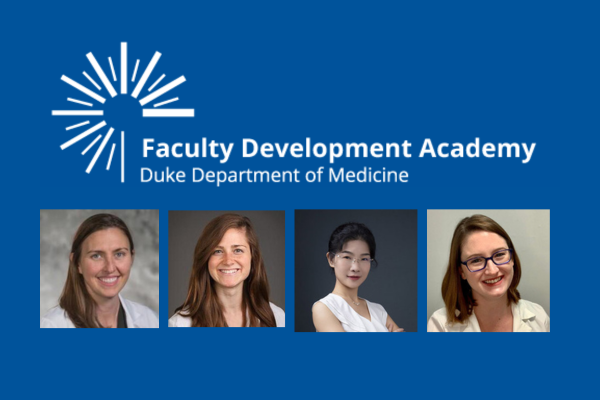
The Duke Department of Medicine is invested in the career development of all faculty. Since its establishment in 2011, the department’s Faculty Development Academy (FDA) provides individual faculty development needs, supplements on-going mentorship, and helps develop faculty in multiple career tracks.
Members of the Academy join one of four branches, each of which is facilitated by a branch chair and senior faculty coaches with a strong mentoring and career development track record, and participate in a career development seminar series.
To highlight the outstanding work of its cohort members this year, Vice Chair for Faculty Development Dr. Carla Brady invited members to speak at its May 14 End of Year Showcase, which featured faculty presentations from each of the four branches.
Here are some of the presentations, followed by reflections on what each participant took away from their year-long experience.
Basic Science-Translational Researcher Branch
Xiaohan Lu, MD
Medical Instructor
Division of Nephrology
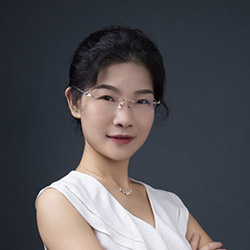
Dr. Lu has been a member of the FDA since September 2023, the program supporting both her professional growth and academic productivity. One of her most significant achievements during this time was submitting two R-level grant applications to the National Institutes of Health. Though unsure yet of how they will score, completing and submitting them was a meaningful first step, she said.
How has the Faculty Development Academy most benefited you?
The FDA has benefited me in several ways. First, the workshops have been extremely helpful in guiding my transition from research associate to junior faculty. Topics such as time management, grant writing, and academic career planning provided practical tools to help me better balance research and service responsibilities. Second, as someone who is not a clinician but a basic science researcher, I found the Translational Science branch particularly valuable. It was designed for people like me and helped me connect with others who share similar interests and face similar challenges. It gave me a sense of community. Third, the mentorship from senior faculty was invaluable. They shared candid insights into career development and offered detailed feedback on grant writing, which was especially helpful.
What is the main takeaway from your experience this year?
My main takeaway from the FDA is the importance of building a support network. I still remember meeting my FDA mentor just as I began my faculty position. At the time, I was struggling to find collaborators and felt discouraged. My mentor shared his own experiences and gave me advice on how to initiate collaborations, which gave me the confidence to keep reaching out. I believe his guidance will have a lasting impact on my career development.
Clinical-Health Services Researcher Branch
Joanna S. Cavalier, MD
Assistant Professor, Hospital Medicine
Associate Medical Director, Digital Strategy Office
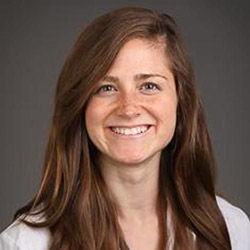
Dr. Cavalier focused her academic work on the design and evaluation of digital health programs. Because the Duke Digital Strategy Office for the health system enables patient-facing technologies, she used her quality improvement and research experience to better understand and enhance digital programs and care delivery models. An analysis of the operational benefits of a centralized virtual care model was recently accepted for publication in the New England Journal of Medicine Catalyst Innovations in Care Delivery.
Related work on understanding patient preferences toward artificial in-basket reposes was also accepted for publication, recently released in JAMA Open. Additionally, Dr. Cavalier collaborated with several groups across Duke on a Patient-Centered Outcomes Research Institute (PCORI) grant application which was awarded funding that begins in the fall. It focuses on the implementation of an electronic patient-reporting outcome monitoring and triage system.
How has the Faculty Development Academy most benefited you?
The mentorship through the FDA has been incredible. I worked with my mentor, Dr. Anthony Galanos, to figure out how I can serve as a partner for research and clinical groups across Duke focused on digital health. We also focused on how to build a learning health system training program for residents that will be impactful for both the trainees and the health system. Because I have taken a less traditional career path, blending administrative leadership, quality improvement, and research, mentorship has been essential to charting the challenges of funding and career growth.
What is the main takeaway from your experience this year?
Collaboration is a powerful and essential tool to advancing digital health at Duke. I am excited to pursue my work in digital health innovation, telehealth, and technology by joining with researchers, clinicians, and leaders from across the health system.
Clinician-Teacher Branch
Jenna McNeill, MD
Assistant Professor
Division of Pulmonary, Allergy, and Critical Care Medicine
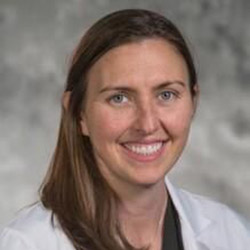
As the associate program director for the critical care fellowship, Dr. McNeill led the creation of a year-long curriculum for the fellows, and paired with the Division of Cardiology to create a designated cardiology track within the fellowship to strengthen Duke's leadership in the critical care space.
How has the Faculty Development Academy most benefited you?
The FDA has allowed for mentoring, feedback and foundation building. As someone who left Duke for 10 years, the FDA has allowed me to make strong relationships with other faculty members in clinical education. Through these relationships, I have learned how to become a better educator, a better program director and a more effective physician on the wards.
What is the main takeaway from your experience this year?
The FDA is a great opportunity to meet smart, kind and passionate colleagues at Duke that you might otherwise not cross paths with. It allows for individual coaching and a chance to work outside of your own division.
Education Scholars Branch
Taylor Broome, MD
Assistant Professor
Division of General Internal Medicine
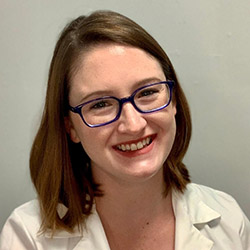
Over the past academic year, Dr. Broome’s most significant achievement through FDA was receiving a Duke AHEAD grant for a medical education scholarship project involving an interdisciplinary collaboration with the Duke University Game Development, Design and Innovation Master of Engineering degree program to create a “serious game” that supports learning about pediatric hospital operations. The experience, she said, helped solidify her identity as an educator so that she can be more focused on growing her skills.
How has the Faculty Development Academy most benefited you?
The FDA has most benefited me by helping me build a scholarly mindset around my educational work. Prior to this experience, I often treated writing and dissemination as secondary to project implementation. Through the FDA, I’ve learned to approach educational initiatives with scholarship in mind from the beginning, identifying research questions, designing with outcomes in focus, and building strategies for broader impact. The program’s structured curriculum, mentorship, and community of peers were instrumental in reshaping how I plan, execute, and reflect on my work.
What is the main takeaway from your experience this year?
The main takeaway from my experience is the importance of community and mentorship in educational scholarship. The FDA created a supportive space where faculty from diverse backgrounds could share ideas, provide feedback, and grow together. It was inspiring to work with other faculty from different departments, and I hope that I can continue to collaborate with other educators.